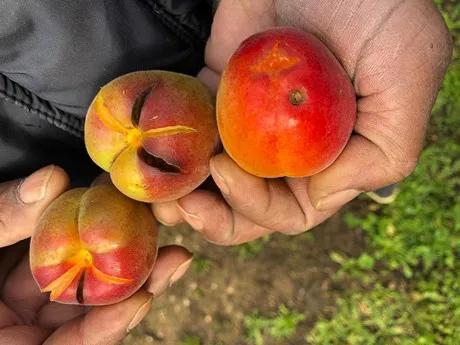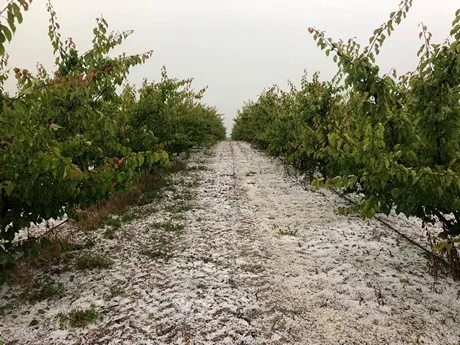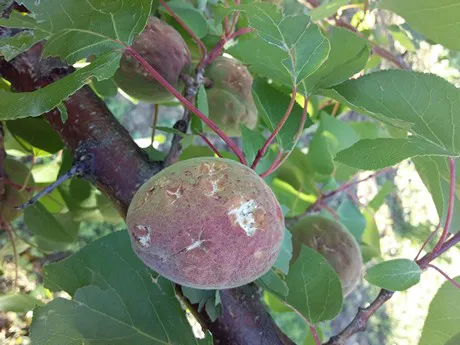Five days after the violent hailstorm that hit some areas of Basilicata and Apulia on the afternoon of Sunday, May 12, 2019, we returned to the fields to better understand the situation in Metapontum.
"The damage is really serious on a good percentage of the harvest. In Matera, the areas most affected are Marconia di Pisticci, Bernalda, Tursi, Rotondella and Montescaglioso. In other areas, fortunately, the crops have not been affected excessively. Francesco Vitelli, president of the Consortium for the Defence of Agricultural Productions based in Metapontum, describes the situation.

"Several millimetres of rain, strong winds and violent hailstorms have destroyed, or at least severely compromised, hundreds and hundreds of hectares of stone fruit, vineyards and citrus groves. According to initial estimates and reports received, only 30% of the crops were insured against such events. In one figure we read that, out of 100 companies, 80 are insured in the north and 20 in the south".

We have also heard from the agronomist Vito Vitelli, who explains: "When storms arrive at high speed, with blows similar to stones, the plants and fruits are filled with wounds through which, after about 24 hours, begin to develop a series of pathogens like mold, fungal agents, bacteria and more".
"In the less affected areas, a plant with slight lesions regenerates within a year. In other places where the event has shown its extreme strength, there is permanent damage, I always propose the drastic pruning or renewal of the plant, just because the trunk and the branches of the plant are the parts not affected".

"Since there are no other solutions for the harvest, as has occurred in some areas of the Ionic arch, it is necessary to carry out anti-mould treatments and wound healing. Although such a hailstorm has been a cause of despair for several farmers, we must look at the positive side: the hailstorm that fell last Sunday occurred at the beginning of the vegetative recovery and not between June and July, when the flower buds of the fruit-bearing plants begin to differentiate. In this way, through a renewal pruning, the plant has every opportunity to regenerate again, so next year, we could have a good harvest, albeit in limited quantities".
The agronomist's advice.
- Farmers should learn to live with the constant and worrying climate changes, trying to adapt to the new agronomic techniques. Among the most important and common are the construction of anti-hail systems. We cannot start a real fruit growing if it is not able to ensure income. We must adopt agronomic techniques that allow us to achieve high productivity and quality, so that we can cover the costs of anti-hail structures.
- The second aspect is the choice of variety. In some areas, we are having frosts when in the past there were no frosts at all. Therefore, in this case, it is necessary to choose varieties that have a later flowering period, adopting the so-called technique of escape (from calamitous events).
- Given the frequent and abundant rainfall in recent years, resort to techniques that can reduce radical asphyxiation. Among the best known, I always recommend raising the bed of cultivation.
- Less soil tillage: Frequent tillage of the soil could result in oxidation of the organic matter, while the turf retains and ensures the structure.
- Rational use of irrigation water. Abundant use, in addition to water bombs, causes problems for plants. Therefore, irrigation techniques must also be adequate.
For more information:
Dott. Vito Vitelli
CONSORZIO VIVAISTI LUCANI
Via Enrico Mattei, 28
75020 Scanzano Jonico (MT)
Tel.: (+39) 0835 954775
Cell.: (+39) 339 2511629
Email: covilvivai@libero.it
Web: covilvivai.com
Blog: vitovitelli.blogspot.com
